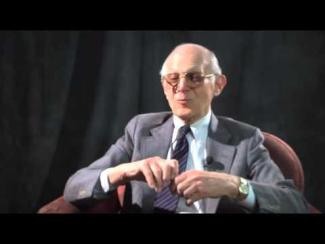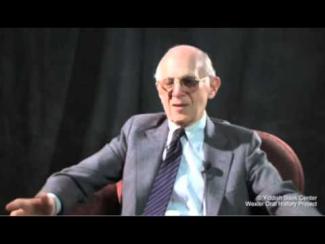The Yiddish Book Center's
Wexler Oral History Project
A growing collection of in-depth interviews with people of all ages and backgrounds, whose stories about the legacy and changing nature of Yiddish language and culture offer a rich and complex chronicle of Jewish identity.
Haim Gunner's Oral History
Haim Gunner, research scientist and Ottawa-born native Yiddish speaker, was interviewed by Christa Whitney on May 12, 2010 at the Yiddish Book Center in Amherst, Massachusetts. From a young age, he was involved in a left-wing Zionist youth group, Hashomer Hatzair. At 18, Haim went to Ontario Agricultural College to learn relevant skills. Concurrently he served as editor of the movement's monthly Youth and Nation periodical. Haim's family left Eastern Europe during the struggles between the White Russians and the Red Army, when the White Russians led a campaign of violence against Jews. He tells of a pogrom in his parents' shtetl; his uncle was shot and killed in the street and his mother hid under a woodpile. His parents escaped to Romania and eventually got to Canada. Haim shares how he learned years later that their shtetl had become a killing camp. Haim discusses his perspective that Ottawa was a divided city with the primary division between the English and the French. Haim experienced violent antisemitism and recalls having to fight bands of French and Irish boys encountered on the way home. He recalls how marginalized he felt being a Jew in that provincial environment. Haim attended the folkshule. some of his parents' friends were horrified that he was sent to be educated by this "heretical" group and in fact the shule eventually disappeared due to lack of support. Haim continued with Hashomer Hatzair and its summer camp and recalls being imbued with their vision of creating an autonomous, Socialist, Jewish cohort in Palestine. A highlight of Haim's life was representing the youth movement on the stage at Madison Square Garden along with Chaim Weitzman and other figures. In 1949 Haim moved to Israel to live on a kibbutz with other North Americans on the Lebanese border. He married and he and his wife had their first child. They left the kibbutz after several years because she was not happy with the childrearing system. He next took a job at UNESCO's Research Council of Israel and then returned to Cornell to complete his doctorate in microbiology and soil science and pursue a post-doc in Ottawa. He accepted a job at the University of Massachusetts while keeping an apartment in Jerusalem and waiting to hear about a job at Hebrew University. He helped to set up the Israeli Environmental Protection Agency and worked as a consultant to the Knesset Committee on the Environment. After describing his research and business ventures, Haim concludes the interview by talking about his role in the formation of the Yiddish Book Center and becoming the first vice president of the Board of Directors.
This interview was conducted in English.
Haim Gunner was born in 1924.




